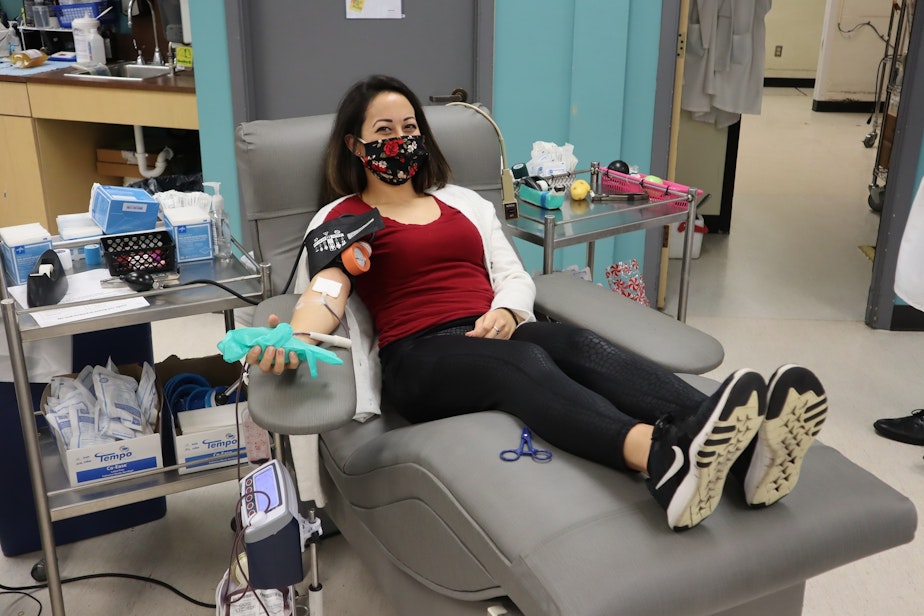'I knew I needed to go out' says blood donor marking anniversary of deadly Amtrak derailment

Three years ago on December 18, a speeding Amtrak Cascades train bound for Portland derailed near DuPont, Washington, and tumbled onto Interstate 5. The crash killed three passengers and injured scores of others. An Olympia woman marked the anniversary Friday by going back to her local blood donation center to achieve a related, but happier milestone.
On the morning of the Amtrak Cascades 501 derailment, Kaitlan Vasquez was getting ready to commute up I-5 to the therapist job she had at the time in Pierce County. She soon realized work would be a no-go when she flipped on the news, which was filled with reports about train cars dangling precariously over the freeway, rescue efforts and traffic gridlock.
Vasquez decided what she could do to help would be to give blood.
"So, I came down here because I wasn't going to be able to go anywhere else that day," Vasquez recollected in an interview Friday outside the Bloodworks Northwest Olympia Donor Center. "As soon as I got here, there were lines of people out the door. I'm pretty sure it was raining like this. Nobody cared. They had their coats and they just waited."
Bloodworks Northwest rushed blood to area hospitals that day in 2017, but it was fortunately not needed much by disaster victims. More than 60 people were injured in the train wreck and three people died. Their concussions, shock, contusions and broken bones weren't the kind of things that required blood transfusions.
Sponsored
Vasquez doesn’t mind.
"December 18 (2017) was my first time. That call for the blood, I knew I needed to go out," she said.
She became hooked on giving blood, as did dozens more first time donors. On the third anniversary of the deadly Amtrak derailment, phlebotomists at the Olympia donation center drew blood from a steady stream of mask-wearing donors, who chatted with one another or scrolled through the day's fresh headlines on their smartphones while resting in reclined chairs.
Vasquez was recognized with a special pin for reaching the two gallons donated milestone at her latest appointment. The visit prompted her to think back to the first time she gave blood.
"I remember receiving an email from Bloodworks saying, 'Your donation has been used to save someone's life at Seattle Children's Hospital,'" she said. "That just touched my heart. To be able to come back and know that my blood is being used to save others' lives, that's amazing. It's awesome."
Sponsored
Vasquez said she had additional motivation to give blood once she overcame her initial queasiness because she herself was once the beneficiary of someone else's gift. She needed a blood transfusion during a scoliosis surgery when she was 12 years old.
The train wreck anniversary has taken on lasting significance for the region's blood banks, too. Bloodworks Northwest successfully sought legislation in Washington state and a governor's proclamation in Oregon to permanently commemorate December 18 as State Blood Donor Day.
The week before Christmas is historically a hard time to get people in to donate blood. To this day, staff at the Olympia donation center say they are inspired by how people stepped up and waited many hours in line to give blood on December 18, 2017.
"We gained a lot of donors that day," said Lynette Manning, Bloodworks Northwest regional manager for donor services, who talked to people in line that day and discovered a lot of them -- like Vasquez -- were giving for the first time.
Manning said the constraints on blood collection operations during the current pandemic leave her a bit worried if there were a repeat of the horrific train wreck in the near future.
Sponsored
"If something like that were to happen right now -- in the way the pandemic is and what we have to do to adhere to social distancing -- I don't know if we could do what we did back then," Manning said on a Bloodworks podcast. "I don't know if we could have this many people come through. That goes to show how important it is for folks to make this a regular thing, to come in on their scheduled appointments to make sure the shelves have that blood."
As a result of the pandemic, blood donation centers such as those run by Bloodworks Northwest have implemented additional intake screening. They no longer take walks-in, but operate by appointment only to space out donors. Everyone has to wear a mask.
"It is definitely a safe activity," said Olympia donor center supervisor James Moore.
During the month of December, Bloodworks Northwest said all donations will be tested for COVID-19 antibodies. The objective is to identify additional people who have recovered from a coronavirus infection, especially those who may not even realize they once had COVID-19.
Bloodworks Northwest spokesperson John Yeager said blood containing antibodies against COVID-19 is very valuable as an experimental treatment for patients now hospitalized with the disease. The so-called convalescent plasma therapy is given to boost a weakened person's immune response.
Sponsored
"Convalescent plasma is a ray of hope for those suffering," Yeager said. "Say, you felt bad back in March or April or you didn't know -- you may have been asymptomatic. Now, you'll find out if you have the antibodies. If you qualify, you can help somebody suffering with it."
Copyright 2020 Northwest News Network

